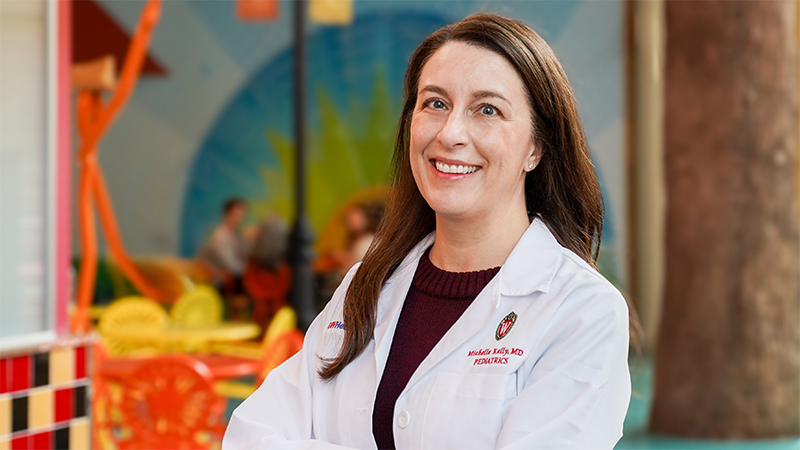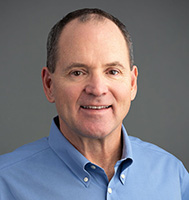
Since last fall, Michelle Kelly, MD, PhD, professor in the Division of Hospital Medicine and Complex Care, and her research group have been continuing research on her ongoing project. The new five-year $1.99 million R01 grant from the Agency of Healthcare Research and Quality (AHRQ) has been supporting the research since September 30. Kelly’s project — Bedside Notes — is a digital health intervention designed to improve parent access to inpatient clinical notes and to engage them in safety concern reporting during their child’s hospital stay. The new grant supports a multi-site evaluation of the intervention, building on years of work by Kelly and co-investigator Ryan Coller, MD, MPH, associate professor and chief of the Division of Hospital Medicine and Complex Care. The R01 award represents a clear sign of confidence in Kelly’s vision and leadership, as she advances as a researcher from mentored training to independent inquiry.
Clinicians not involved in research through NIH, AHRQ, and similar organizations may perceive grant activity codes as a secret language of letters, such as Fs, Ts, Ks, Rs, and digits. For those in the thick of it, however, those award letter and number codes indicate progress through challenging stages of advancement in a research career. Early research grants are stepping stones to proficiency — such as fellowship (F) and training (T) awards — while the leap from a K to an R grant is a big advance in a researcher’s career.
As a clinician trained in hospital medicine, Kelly has been acutely aware of the preventable harm that hospitalized children experience at rates significantly higher than adults. Her work addresses that well-documented issue. The Bedside Notes intervention empowers parents to view clinical notes in real time through bedside iPads and to communicate safety concerns directly with their child’s care team.
Her earlier K08 award, beginning in 2020, laid the groundwork. It supported the design and piloting of Bedside Notes and emphasized Kelly’s development as a physician-scientist. “Hospitalized children suffer harm from medical errors at a rate three times that of adults,” she wrote in her K08 application. “They depend on clinicians to partner with families to prevent harm.”
A K08 Clinical Investigator Award is an early career research grant of three to five years intended for “research training and career development.” To this end, a K08 plan requires that the researcher find mentors and address identified knowledge gaps. One of Kelly’s K08 mentors was Pascale Carayon, PhD, now professor emerita in the department of industrial and system engineering. Carayon’s influence in the field of health care systems engineering has been foundational, and her expertise in human factors engineering helped Kelly integrate systems thinking into her research approach. Human factors engineering incorporates human abilities and limitations in the design of systems, including tools and technologies as well as aspects of the work environment, with the goal of effectiveness, ease of use, and safety.
Kelly noted that Carayon clarified for her the true end of the K08 award. “People often focus on the research project,” Kelly said. “But as Dr. Carayon told me, it’s about you developing as a scientist — so that whatever you work on in the future, you’ll approach it rigorously.”
Kelly’s second K08 mentor was Coller. A physician-scientist himself, Coller’s own research applies mixed methods to design and test interventions to improve family-centered outcomes for children with medical complexity and to prevent hospitalizations.
Coller and Carayon together helped Kelly map a plan to transition from a K award to an R01. “You have to lay it out clearly — for yourself and your mentors — and then execute it,” she said.
She also noted the vital institutional support: “The K covers 75% of your time and a small budget, but it’s not enough to hire staff. The department’s supplemental funding allowed me to bring on a research coordinator — and that was crucial to building our team.”
Equally important, Kelly added, was the support of her division: “My colleagues and division leadership were incredibly generous in helping to protect my time — including covering clinical responsibilities when needed. That kind of backing makes a huge difference when you’re trying to build something from the ground up.”
While still in the K08 phase of her career, Kelly also secured an R21 grant — a prestigious award designed to support exploratory or high-risk/high-reward research. The R21 allows investigators to pursue novel ideas that may not yet be supported by extensive preliminary data, but which show strong promise.
This grant further validated the significance of Kelly’s research direction and gave her the opportunity to pursue additional questions emerging from the Bedside Notes project. It also helped her continue building the infrastructure and evidence base needed to support the eventual R01 application.
Kelly’s transition to independence wasn’t fueled by a single grant—it was made possible by a supportive research-centric ecosystem. In addition to her K08, R21, and PhD training, she leveraged funding from Department of Pediatrics Research and Development Awards and a pilot award from the University of Wisconsin Institute for Clinical and Translational Research (ICTR) to build the foundation for her R01 submission.
“These early institutional investments gave us the flexibility to generate pilot data, refine the intervention, and prepare a competitive R01 application,” she said. “That kind of support is everything when you’re trying to take the next step.”
She emphasized how much the combined support — federal, departmental, and institutional — made a difference. “It really does take a village. From mentorship to R&D funding to pilot grants, every piece helped move this work forward,” Kelly explained.

Describing the K08 award as a time for researchers to learn, grow, and focus their interests, James (Jim) Gern, MD, professor in the Division of Allergy, Immunology, and Rheumatology, and vice chair of research for the department, echoed the importance of mentorship during the K award phase.
“The K awards are really meant to be mentored research awards. You have a mentor you can really depend on and have open communication with about how to navigate all the decisions needed to create a successful research program and a successful academic career,” Gern explained.
Gern also emphasized the value of protecting time and energy to focus. “When you’re on a K award, you want to open doors that lead to productive research. You need to be able to say No to things that could distract you — even very engaging things. To be able to say, I need to ask my mentoring team about that, tells people seeking your time what you need to convey,” Gern said.
He noted that one key sign of readiness for the R01 is the ability to shift into a leadership perspective. “During a K, you’re doing a lot of the work yourself — learning by doing,” he said. “When you get an R01, you’re leading a team, managing budgets, supervising staff. It’s a major transition in your role as a researcher.”
Both Gern and Kelly noted that ICTR has enormous resources for early-career researchers, from the mentored KL2 Scholars Program to diverse assistance with K08s. “Many people working with ICTR have gone on to R01s,” Gern said.
Kelly made full use of ICTR’s resources during her K08, including earning a PhD in Clinical Investigation through the institute. The KL2 Scholars Program, ICTR’s mentored training initiative, provides seminars, grant writing support, and protected time for early-career researchers preparing for independent funding.
Marin Schweizer-Looby, PhD, professor in the Department of Medicine Division of Infectious Disease, co-directs the KL2 Scholars program at ICTR. She said, “The KL2 program provides support and guidance for early-career faculty members to perform research that will improve the health of individuals and the public. We provide protected time to perform high-quality research and guidance on successfully submitting grants for future funding such as R01s.”
Currently, two members of the Department of Pediatrics faculty are participating in the KL2 program: Matthew Harer, MD, associate professor in the Division of Neonatology and Newborn Nursery, and Jo Wilson, MD, assistant professor in the Division of Allergy, Immunology, and Rheumatology. They are new researchers continuing the department’s long reputation of ongoing research in pediatric health issues.
Photo by Kate Feldt/Department of Pediatrics